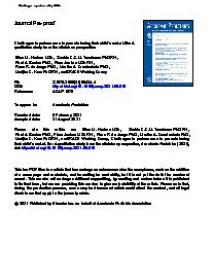Challenges in Preloss Care to Parents Facing their Child's End-of-Life : a Qualitative Study from the Clinicians Persperctive
Objective
Bereavement care for parents predominantly focuses on care after child loss. However, Health Care Professionals (HCPs) feel responsible for supporting parents who are grieving losses in their child's end-of-life. Preloss care is tailored to the parents’ needs, thus highly varying. To better understand the nature of preloss care, this study aims to gain insight into the challenges HCPs encounter while providing care for parents during their child's end-of-life.
Methods
Exploratory qualitative research using semistructured interviews with physicians and nurses working in neonatology and pediatrics in 3 university pediatric hospitals and 1 child home care service. A multidisciplinary team thematically analyzed the data.
Results
Twenty-two HCPs participated in this study. From the HCPs' inner perspective, three dyadic dimensions in preloss care delivery were identified that create tension in HCPs: sustaining hope versus realistic prospects, obtaining emotional closeness versus emotional distance, and exploring emotions versus containing emotions. Throughout preloss care delivery, HCPs weighed which strategies to use based on their perception of parental needs, the situation, and their own competencies. HCPs remained with lingering uncertainties on whether the preloss care they provide constituted optimal care.
Conclusions
As a result of the experienced tension, HCPs are at risk for prolonged distress and possibly even compassion fatigue. In order to maintain a positive emotional balance in HCPs, education should focus on adapting positive coping strategies and provide hands-on training. Furthermore, on an institutional level a safe environment should be fostered and well-being could be enhanced through learning by sharing as a team.
Geachte bezoeker,
De informatie die u nu opvraagt, kan door psychotraumanet niet aan u worden getoond. Dit kan verschillende redenen hebben,
waarvan (bescherming van het) auteursrecht de meeste voorkomende is. Wanneer het mogelijk is om u door te verwijzen naar de bron
van deze informatie, dan ziet u hier onder een link naar die plek.
Als er geen link staat, kunt u contact opnemen met de bibliotheek,
die u verder op weg kan helpen.
Met vriendelijke groet,
Het psychotraumanet-team.
In: Academic pediatrics ; ISSN: 1876-2867 | 22 | 6 | August | 910-917
https://doi.org/10.1016/j.acap.2021.08.015


